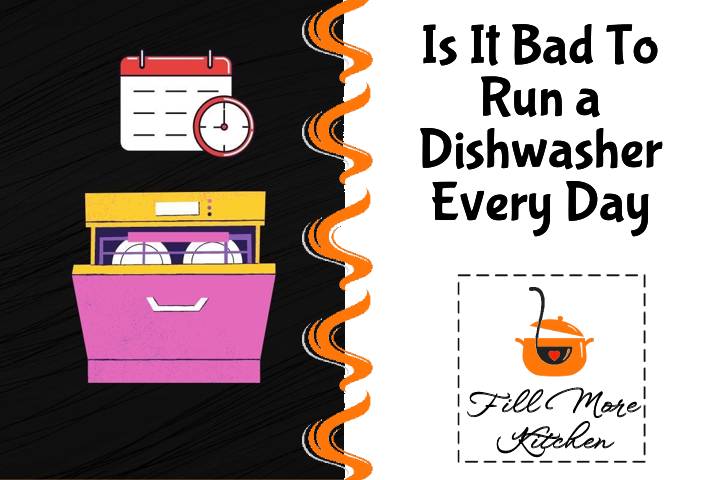Upon acquiring an apartment with a built-in dishwasher, I was ecstatic as it made my daily routine of disposing of my coffee mug, plates, dishes, and pots much easier. However, this raises the question of whether running a dishwasher every day is detrimental.
Using your dishwasher daily is not a problem, but it’s advisable to wait for a full load to avoid potential damages caused by running it with only a few dishes.
If you’re unsure about how often you should run your dishwasher, this article will provide guidance on the appropriate frequency to use the appliance.
How Often Should You Use Your Dishwasher?
It is recommended to use your dishwasher as frequently as possible, ideally at least once a week, to prevent issues that may arise from leaving it unused for extended periods of time.
There are various factors that determine how often a dishwasher is utilized. These factors may include:
- The frequency at which meals are cooked.
- The quantity of people residing in the household.
- Personal preference.
However, it is important to consider that a dishwasher in a household of four may operate more frequently than one in a busy food establishment due to various factors, which we will discuss further.
Domestic Dishwasher
Running dishwashers in the house once a week is recommended to maintain the good operating order of motor seals. If left inactive for long periods, the water in the machine can evaporate and cause pipe clogs and motor damage.
Keep in mind that the frequency of using the dishwasher mostly relies on the household’s size. If you reside alone, you might not use the dishwasher frequently since it takes more time to fill up. On the other hand, a bigger family or someone who hosts gatherings often may need to run it twice as much.
Commercial Dishwashers
Dishwashers used in commercial settings are frequently operated on a daily basis because of the significant amount of soiled dishes that need to be cleaned, and occasionally, they may even be run two or three times per day during periods of heavy customer traffic.
Nowadays, dishwashing machines are ubiquitous in restaurants as they guarantee a sufficiently high temperature to sanitize the cookware, utensils, and silverware, thereby complying with health regulations.
Can You Overuse a Dishwasher?
No, it is not harmful to run your dishwasher every day as long as you operate it correctly and perform routine maintenance checks since it is a machine designed to clean your dishes, regardless of how often you use it.
However, there are dissenting opinions on this matter. Certain individuals contend that decreasing the frequency of dishwasher usage per week can enhance the appliance’s durability.
As per the president of Mr Appliance, Ron Shimek, dishwashers are used around five times a week on average in American households, which leads to a higher need for repairs.
How Much Does It Cost To Run a Dishwasher Every Day?
Although dishwashers are considered to be more environmentally friendly and hygienic than hand-washing, many people wonder if they can help save time, money, and water.
According to Statista, a typical household of four individuals uses around 118 gallons (450 liters) of water daily, and the cost varies depending on the location, season, and time of day due to water tariffs.
The typical dishwasher requires 1,800 watts of power. In the United States, the average electricity rate is 10.42 cents per kWh. To figure out the cost of running your dishwasher for one hour five days a week, multiply the watts by the time it takes to finish a wash.
- One hour of using a dishwasher with a power consumption of 1800 watts results in 1800 watt-hours.
- One kilowatt is equivalent to 1000 watts, therefore 1800 divided by 1000 equals 1.8 per hour.
- Your weekly consumption of the dishwasher is 9kWh, which is calculated by multiplying 1.8kWh by 5.
- To calculate the cost, simply multiply the kilowatt-hour (kWh) by the average price per kWh.
- 1.8 X $10.42 = $18.75
How To Make a Dishwasher Last Longer
It is possible to extend the lifespan of a dishwasher beyond 10-12 years and up to 15 years or more by using it correctly, arranging regular maintenance checks, and fixing or replacing any damaged components.
Implementing these suggestions can assist in extending the lifespan of your dishwasher.
Don’t Overload the Machine
What you observe inside your dishwasher is not just for show, as the design is specifically aimed at enhancing its functionality to optimize the cleaning efficiency of every cycle while avoiding overburdening the appliance.
The main objective of the cleaning chamber is to achieve maximum efficiency. Surprisingly, there is a proper way to arrange items in a dishwasher.
Consult the manual for guidance, although generally:
- The lower compartment of the dishwasher is designated for storing dishes, cookware, and utensils such as large plates and bowls.
- The top shelf of the dishwasher is where mugs, glasses, cups, and small dishes are organized.
- Utensils with a flat shape, such as baking sheets, trays, and serving platters, can be placed on the outer perimeter of the lower rack.
Objects positioned near the spray arm can impede the movement of water and ought to be taken away.
It is not advisable to overload a dishwasher with dirty dishes as it can hinder the proper distribution of water and detergent by the spray arm within the compartment.
If dishes are not adequately cleaned at the end of a cycle, running them through another cycle can result in wastage of energy, water, and time which can be avoided by loading the dishes properly.
Deep Clean Regularly
It is not safe to assume that the dishwasher is hygienic and free from dirt just because it cleans your dirty dishes, as there can be a buildup of various substances such as grease, lime, food particles, undissolved detergent, and even unpleasant smells.
If you notice an accumulation of residue, it is recommended to perform a more frequent deep cleaning of your dishwasher, ideally once a month, using vinegar to dissolve any grease and baking soda to absorb unpleasant smells.
Conduct Maintenance Checks
While dishwashers require minimal upkeep, it is still inexpensive to conduct routine inspections. Instead of immediately contacting a professional, you can easily perform the necessary tasks yourself by utilizing this checklist as a helpful guide.
- Inspect the door gaskets for signs of wear or tear.
- Ensure that the hinges, handles, knobs, and buttons are functioning properly.
- Inspect the plastic coating on the dishwasher racks.
- Remove the lime buildup from the water supply equipment.
- Make sure that the pipes and nozzles are free from any blockages.
- Clean the scrap tray.
- Check for leaks.
Scheduling maintenance checks on the same day as cleaning the dishwasher is recommended as it allows for easier detection of any faulty parts while removing debris.
Place in a Suitable Spot
Pay attention to the location of the dishwasher in relation to other kitchen appliances as it has a considerable impact on its energy efficiency.
It is not recommended to install a dishwasher next to an ice maker because the ice maker needs a cool environment while the dishwasher produces a lot of heat, causing both appliances to interfere with each other and consume more electricity, ultimately reducing their lifespan.
How to Maximize the Energy Efficiency of the Dishwasher
Throughout time, I have acquired several effective techniques to decrease the energy consumption of the dishwasher, and I am happy to disclose them with you.
Here are some tips to maximize the efficiency of your dishwasher and reduce electricity consumption.
- Operate the dishwasher during non-peak periods such as early morning or late evening.
- Use with a full load.
- Properly organize the dishes.
- Prevent putting too many dishes in the dishwasher.
- Skip the pre-rinse.
- Instead of using the hot drying option on the machine, it is recommended to let the dishes air dry.
Can You Run a Dishwasher Overnight?
Opinions differ on whether running a dishwasher every day is safe. Some argue that it is an electrical device and should not be left unattended while sleeping, despite the fact that instances of fires caused by malfunctioning dishwashers are rare.
Running any machine with a suspected or confirmed issue during the night is not recommended as these faulty components can pose a fire hazard, rather than the process itself.
Despite concerns about energy consumption and safety, many people believe that running the dishwasher overnight is a cost-effective and safe option. With modern technology, dishwashers are designed to automatically complete their cycle and shut off, so there is minimal risk of leaks or fires as long as the appliance is functioning properly.
Electricity rates are cheaper during off-peak hours due to decreased usage, resulting in lower demand and reduced costs per kWh consumed.
If you clean your dishes during off-peak hours, such as late at night when most households are asleep, you can reduce your energy expenses and wake up to a clean load of dishes, eliminating one task from your to-do list.
Can You Leave Dishes In the Dishwasher Overnight?
Yes, it is possible to leave both soiled and washed dishes in the dishwasher overnight. Running a full cycle when the machine is not completely filled is inefficient, and it can also damage the dishes as they collide and make noise against each other.
Dirty Dishes
Once you remove any leftover food from the dishes, it may be necessary to rinse them before loading them into the appliance. Modern dishwashers are highly effective at removing food particles without requiring us to wash our dishes beforehand.
However, if there is an excess of food left on plates overnight, even the most advanced dishwasher can produce unpleasant smells and draw in pests.
Running a dishwasher when it’s not full is wasteful in terms of energy and water. However, most dishwashers come with timers that allow you to delay the cycle until a more convenient time, so it’s better to wait until the dishwasher is full before running it.
Clean Dishes
If you choose to clean up after your evening meal and the dishwasher finishes its cycle just as you’re ready to go to sleep, it’s okay to leave the dishes inside until you’re prepared to empty them; simply open the door slightly and retire for the night.
You can skip the drying cycle and take advantage of the contrast between the warm, moist air inside the dishwasher and the cooler air outside to promote air drying.
In Summary
There is no rule that prohibits you from using your dishwasher daily, so if you have enough dishes to fill it up in a day, you can run it at any convenient time such as after dinner, overnight, or the next morning.
You can also check this video about “Is It Bad To Run a Dishwasher Every Day?”
Check out our top 10 reviews!
Related posts
https://fillmorekitchen.com/can-you-eat-soft-boiled-eggs-left-out-overnight/
https://fillmorekitchen.com/can-you-eat-mozzarella-sticks-left-out-overnight/
https://fillmorekitchen.com/how-can-you-tell-if-coffee-is-moldy/
https://fillmorekitchen.com/can-you-steam-in-an-instant-pot/
https://fillmorekitchen.com/how-long-can-you-leave-rice-in-a-rice-cooker/



